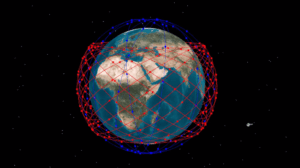WASHINGTON — Maxar Technologies no longer expects, at least initially, to win any manufacturing contracts for Telesat’s future multibillion-dollar broadband megaconstellation of roughly 300 satellites.
Dan Jablonsky, Maxar’s chief executive, said Aug. 5 during an earnings call that a procurement decision for the constellation, called Telesat LEO, remains delayed — an announcement was expected in mid-2019 — and no longer looks like a significant business opportunity for Maxar.
“Every quarter it’s been the next quarter,” Jablonsky said of a decision. “In its current form, we are not expecting active participation.”
Maxar received a study contract from Telesat two years ago to design an architecture for the broadband constellation with then-partner Thales Alenia Space. The two companies terminated their collaboration in late 2019, and Thales Alenia Space later teamed with Airbus Defence and Space to bid for the constellation.
Jablonsky said Maxar is monitoring opportunities to build commercial communications satellite constellations, but will not pursue all of them.
“Telesat’s been a long time customer of ours,” he said. “We’ve built a lot of GEO satellites for them. If and when they need us either for that or for the Telesat LEO program, as it may morph in the future, we’re very happy to provide services.”
Dan Goldberg, Telesat chief executive, said during a July 30 earnings call that Telesat remains “fully engaged” with suppliers of satellites, launch services and ground terminals.
“In the coming months you should be hearing from us [about being] in a position to make some definitive announcements with respect to procurement and financing,” Goldberg said.
Telesat LEO satellites will have onboard processing, phased array antennas and inter-satellite links, Goldberg said, and will be optimised for broadband to airplanes, ships, governments and businesses. Consumer broadband is not a focus of Telesat LEO, he said.
Telesat still expects its future LEO constellation to start service in 2022, according to the company website. Telesat has not said how many satellites it expects to award under an initial contract.
Jablonsky said Maxar is looking for other uses of the satellite bus it designed for Telesat LEO, such as for other commercial constellations or defense and intelligence applications.
Maxar’s Space Infrastructure division, which builds satellites, has business almost exclusively with commercial and civil space customers, but Maxar is pursuing defense programs as an expansion area. Jablonsky said the company eventually hopes to see its Space Infrastructure business split one-third each between commercial, civil, and defense space projects.
Maxar reported a net income of $306 million from revenues of $439 million for the three months ended June 30, figures buoyed by the divestiture of MDA in April. Roughly 63% of Maxar’s revenue came from its Earth observation business, which includes the WorldView satellites and associated geospatial intelligence products and services.
Maxar’s six-satellite, $600-million WorldView Legion constellation remains on track for a first launch in the first half of 2021 on a SpaceX Falcon 9 rocket, Jablonsky said. The company is building WorldView Legion in house, and expects the constellation to triple Maxar’s ability to collect 30-centimeter-resolution optical imagery.
Commercial
AirbusMaxarTelesatThales Alenia Space
– Advertisement –
